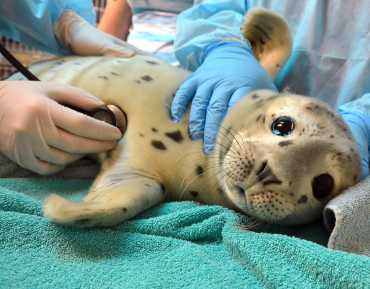
Experts Suspect Blunt Force Trauma Due to Ship Strike the Cause of Death for Endangered Fin Whale
- Species conservation
- Pathology
Experts suspect an endangered fin whale that washed ashore in San Francisco this weekend died due to injuries sustained from a ship strike. Scientists from The Marine Mammal Center, the world’s largest marine mammal hospital, as well as from the California Academy of Sciences and U.C. Santa Cruz investigated the animal’s death in a necropsy Saturday afternoon.
“By investigating deaths like this, we can learn more about how human activity and changing environmental trends are impacting large whales,” says Barbie Halaska, Necropsy Manager for The Marine Mammal Center.
Ship strikes are the biggest threat fin whales face, so this investigation helps us understand the challenges these animals face and inform decision-makers so we can safely share the ocean with marine wildlife.
Initially reported to The Marine Mammal Center early Friday morning by the U.S. Coast Guard, the whale carcass was sighted a few miles offshore west of the Golden Gate Bridge. By Friday night, it landed at Fort Funston in San Francisco.
During Saturday’s necropsy, scientists discovered significant bruising and hemorrhaging to muscle around the whale’s neck vertebrae consistent with blunt force trauma due to ship strike. The team identified the fin whale as a 46-foot juvenile male that was moderately decomposed based on the quality of the internal organs. Experts noted the whale was in average body condition based on the blubber layer and internal fat levels. The whale also had a stomach full of krill, a primary food source.
“Although unfortunate, these deaths offer a unique opportunity for scientists to look more closely at these animals that are usually inaccessible to us,” says Moe Flannery, Senior Collections Manager of Birds and Mammals for the California Academy of Sciences.
By archiving specimens and data, researchers from around the world will be able to answer important questions to inform policy and conservation decisions for decades to come.
The Marine Mammal Center has responded to six other fin whales in its 46-year history. Five of the six died from trauma due to ship strike.
The fin whale is the second-largest species of whale and is listed as endangered under the Endangered Species Act. Fin whales are typically found offshore in deep waters, and the biggest threat to this species is ship strikes. Large whales are vulnerable to collisions with all vessel types, sizes and classes throughout the world's ocean. When large vessels such as container ships are involved, the ship's crew may be unaware a strike has occurred. As such, the number of ship strikes to whales is likely underreported.
Malnutrition, entanglement and trauma from ship strikes have been the most common causes of death in whales studied by the Center’s research team in recent years. The Center’s researchers study the locations and behaviors of whales in the San Francisco Bay so that informed decisions can be made to better protect whales. Public funding and support for this investigatory work is essential.
The Marine Mammal Center collected tissue samples and bone to contribute to baseline data and various research studies. The California Academy of Sciences archived the whale’s pelvic bones, ear bones, and baleen in their scientific research collection.
As an essential nonprofit organization operating during the ongoing pandemic, the Center and its partners are currently deploying response teams with fewer personnel for shorter durations and with increased personal protective equipment to safely continue this important work. This necessary action has led to a decrease in data and sample collection during necropsies, which can make it more difficult to determine why a whale may have washed ashore.
The public can play an important role in the conservation of whales by reporting sightings. To report a dead whale or whale in distress, call the Center’s rescue hotline at 415-289-SEAL (7325).
Yes, I want to save a life!

Yes, I want to save a life!
You’ll be giving sick and injured animals the best possible care at the Center’s state-of-the-art hospital. With your gift today, you are giving a patient a second chance at life in the wild.
See Our Latest News
{"image":"\/Animals\/Patients\/Harbor seals\/2024\/cropped-images\/hs-sandia-by-bill-hunnewell-c-the-marine-mammal-center-313-14-4124-3222-1713562157.jpg","alt":"A newborn seal pup with a fluffy lanugo coat looks up. ","title":"Pupping Season Spotlight: Caring for an Orphaned Harbor Seal Pup","link_url":"https:\/\/www.marinemammalcenter.org\/news\/pupping-season-spotlight-caring-for-an-orphaned-harbor-seal-pup","label":"Patient Update","date":"2024-04-22 02:00:00"}

Pupping Season Spotlight: Caring for an Orphaned Harbor Seal Pup
April 22, 2024
Read More{"image":"\/Misc\/Graphics\/cropped-images\/climate-change-graphic-giant-earth-shutterstock-1798-6-5113-3994-1680046432.jpg","alt":"An Earth Day graphic of people holding the planet, recycling, planting a tree and moving a solar panel.","title":"5 Ways to Celebrate Earth Day","link_url":"https:\/\/www.marinemammalcenter.org\/news\/5-ways-to-celebrate-earth-day","label":"News Update","date":"2024-04-18 02:00:00"}

{"image":"\/Animals\/Patients\/Hawaiian monk seals\/2024\/cropped-images\/hms-rs10-release-photo-c-the-marine-mammal-center-noaa-permit-24359-0-0-966-755-1712699238.jpg","alt":"Hawaiian monk seal RS10 is released and heads toward the water","title":"Endangered Hawaiian Monk Seal Back Home on Kaua\u02bbi After Receiving Life-Saving Care for Ingested Fishing Gear","link_url":"https:\/\/www.marinemammalcenter.org\/news\/endangered-hawaiian-monk-seal-back-home-on-kauai-after-receiving-life-saving-care-for-ingested-fishing-gear","label":"Press Release","date":"2024-04-09 02:00:00"}

Endangered Hawaiian Monk Seal Back Home on Kauaʻi After Receiving Life-Saving Care for Ingested Fishing Gear
April 9, 2024
Read More{"image":"\/Animals\/Wild\/Sea otter\/cropped-images\/sea-otter-mom-pup-photo-c-brian-simuro-505-0-3387-2646-1618247266.jpg","alt":"sea otter mother and pup","title":"Top Eco Friendly Mother\u2019s Day Gifts that Give Back","link_url":"https:\/\/www.marinemammalcenter.org\/news\/eco-friendly-mothers-day-gifts-that-give-back","label":"News Update","date":"2024-04-08 02:00:00"}

pathology
Barbie Halaska